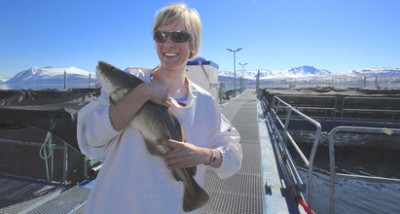Scientists and fish breeders believe they have discovered a calmer, more robust species of cod that can better handle stress and disturbance. The discovery could have major implications for the fish-farming industry in Norway.

Cod farming has been going on for more than 20 years in Norway, but without great success. This is partly because wild cod is abundant in the waters off Norway and cod prices are low because of record high catches. There’s thus little demand for farmed cod, and it hasn’t been easy to find a species of cod that has the right temperament, and is robust enough, for farming.
Researcher Tale Marie Karlsson Drangsholt thinks the latter problem, at least, may have been solved. Drangsholt, who works for the food research institute Nofima has studied the behaviour of 320 individual fish, from 15 genetically different “cod families.” She observed and filmed different species of cod swimming in identical containers and found that they reacted in different ways when they were exposed to a flash of light. Most of the fish stopped and seemed to be scared, but there were a few who didn’t seem to mind.
“We have the same cod families out in the netpens at sea,” Drangsholt told newspaper Aftenposten. “Now we will follow them to see which ones grow the quickest.”
Less stress, less disease
Research points to the fear reaction among the fish as being genetic, and that the fearless species thrive better and could be more resistant to disease in the fish-farming enclosures. These fish could also potentially be bred further to produce safer and less-stressed farmed cod.
Cod has not, as yet, been farmed with the same intensity or on the same scale as salmon, at least partly because of the cod’s behaviour in artificial conditions. This could change if researchers are able to develop the fearless characteristics, Drangsholt believes.
She now wants to extend her research to salmon farming, to find out if there are also stressed species of salmon that are more prone to sickness than calmer ones, and whether they could also breed a quieter and more robust type of farmed salmon.
Drangsholt’s research at Nofima comes at a time when fish-farming is under sharp criticism in Norway and around the world, because of ongoing problems with salmon lice and, most recently, concerns about high levels of toxins in Norwegian farmed salmon. Norway is behind 60 percent of the world’s production of farmed salmon, and seafood in general is one of the country’s major export products, second only to oil and gas.
That means huge investment in research and development, as well as global marketing campaigns. Ingrid Olesen research chief at Nofima, said the fish-farming industry remains interested in farmed cod but needs “a more robust cod.” Olesen calls Drangsholt’s research “promising,” and thinks it could help improve salmon farming as well.
Views and News from Norway/Elizabeth Lindsay
Please support our news service. Readers in Norway can use our donor account. Our international readers can click on our “Donate” button:

